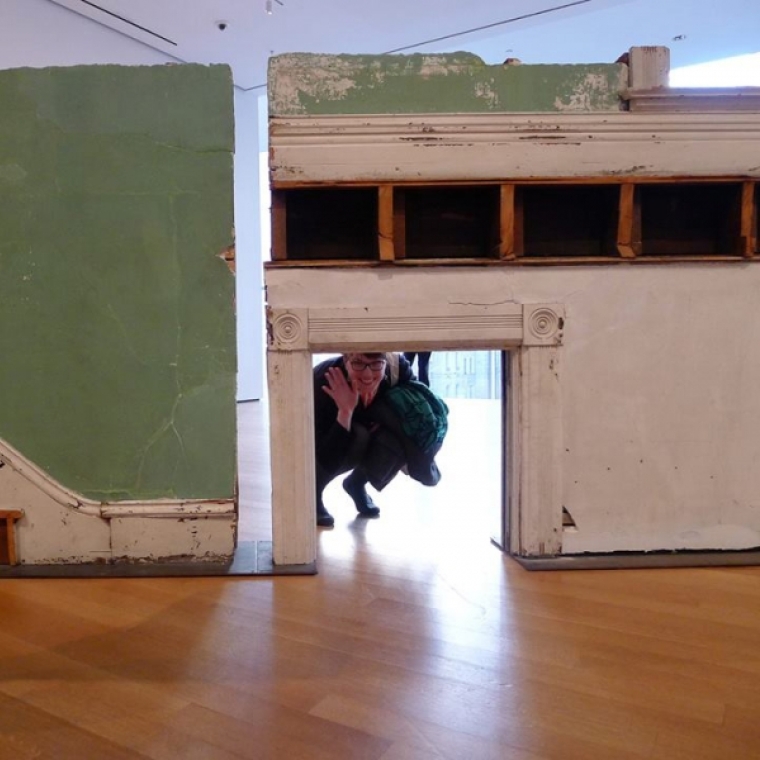

Stuart Weitzman School of Design
102 Meyerson Hall
210 South 34th Street
Philadelphia, PA 19104

What kind of work are you doing?
I have a very full plate working as a curator, contributing freelance criticism and art historical writing when I can, guest lecturing at universities, being a part of an artist-run non-profit space (Vox Populi) and making my own art work.
What led you to your current position?
Currently I work as a Curatorial Fellow in Photography and New Media at the Michener Art Museum, just north of Philadelphia. I was also just awarded a grant for a major independent curatorial project and publication which I will also be embarking on in the next two years. When I first left Penn I was teaching photography and digital arts, and slowly made my way into a more active writing practice and helping facilitate exhibitions. Eventually I realized exhibition projects really paralleled my research-driven artistic practice and I was fortunate enough to be able to jump into curatorial work full time. Having worked during my time in graduate school at the PennMuseum helped me make the transition with crucial museum work experience behind me.
What attracted you to the firm or position?
The Fellowship is a brand new position helping shape future programming and a new curatorial focus at the museum where I work. That excited me and was similar to the years I was at Penn when the new interdisciplinary MFA program was just taking shape. I like to be a part of things as they are forming as I feel you can play a really vital role actively contributing.
How did your studies at Weitzman School prepare you for your work there?
My work at Penn has trickled into all aspects of my life in different ways. For example, the independent curatorial project I am embarking on is about pioneering female artists using new media, video, and responding to the changes in technology in the 1970s. My master’s thesis involved making an Arduino based hacked Polaroid land camera and a body of work with it. So I’m striving to create curatorial projects that allow me to move from my personal practice into situating an art historical moment when other female artists were upending stereotypes and engaging with technology.
What courses, studios or instructors had the greatest influence on your work or thinking?
Matt Freedman's Drawing Seminar expanded my horizons in unexpected ways. I walked away from that course realizing how to better make rules for my own studio practice to further generate work, and also how to creatively bend the rules when a situation demands work from me. It taught me how to be a more resilient studio artist. Orkan Telhan’s Creative Research class helped me embrace the full spectrum of research that goes into one of my projects.
What was the best part of studying at Weitzman School? In Philly?
Having the Institute of Contemporary Art with the lectures, exhibitions, and programming it brings into Philadelphia right around the corner is a tremendous asset to the MFA program that differentiates it from many schools I looked at. The greater visiting critic series in the MFA program is so robust. There were some weeks where I would have three studio visits with outside curators, artists, and cultural practitioners beyond the program. The diversity of worldviews you are exposed to helps you find your niche in the broader art world. Working in Landscape Architecture taught me how to better collaborate with interdisciplinary peers and a whole new lens for considering the environments around me that impacts my thinking to this day. Having the possibility to take classes outside of the MFA department shapes a more dynamic and generative studio practice.
Where do you see yourself in 5 years?
I hope to be in a place where I can continue to balance my curatorial, teaching, writing, and studio work. They all inform each other. I’ve got a few more projects I’m itching to write books about too.
Are you keeping in touch with classmates, students or faculty?
I still live and work in the Philadelphia area, so I stay in touch with a range of peers from my time at Penn as well as newer students in the program. Philadelphia is thriving and filled with activity right now, but it is still approachable enough that it feels intimate. I regularly run into the faculty at art events and am fortunate to keep great relations with quite a few of them.
Any words of advice for prospective students?
If you think you already know all of the work you want to make, then you don’t need an MFA. But if you want to be challenged and expand the possibilities for your studio then you will find endless questions and new avenues of inquiry here. Take classes in the greater University that intrigue you and don’t let the standard coursework stop you from asking how you bring the material back into the studio. Take advantage of the teaching, fellowship, and work/study opportunities, they’re tremendous and will set you apart from other MFA grads nationally.